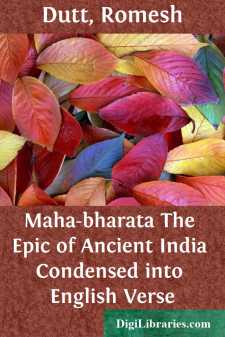Categories
- Antiques & Collectibles 13
- Architecture 36
- Art 48
- Bibles 22
- Biography & Autobiography 813
- Body, Mind & Spirit 142
- Business & Economics 28
- Children's Books 14
- Children's Fiction 11
- Computers 4
- Cooking 94
- Crafts & Hobbies 4
- Drama 346
- Education 46
- Family & Relationships 57
- Fiction 11828
- Games 19
- Gardening 17
- Health & Fitness 34
- History 1377
- House & Home 1
- Humor 147
- Juvenile Fiction 1873
- Juvenile Nonfiction 202
- Language Arts & Disciplines 88
- Law 16
- Literary Collections 686
- Literary Criticism 179
- Mathematics 13
- Medical 41
- Music 40
- Nature 179
- Non-Classifiable 1768
- Performing Arts 7
- Periodicals 1453
- Philosophy 64
- Photography 2
- Poetry 896
- Political Science 203
- Psychology 42
- Reference 154
- Religion 513
- Science 126
- Self-Help 84
- Social Science 81
- Sports & Recreation 34
- Study Aids 3
- Technology & Engineering 59
- Transportation 23
- Travel 463
- True Crime 29
Maha-bharata The Epic of Ancient India Condensed into English Verse
by: Romesh Dutt
Categories:
Description:
Excerpt
The scene of the Epic is the ancient kingdom of the Kurus which flourished along the upper course of the Ganges; and the historical fact on which the Epic is based is a great war which took place between the Kurus and a neighbouring tribe, the Panchalas, in the thirteenth or fourteenth century before Christ.
According to the Epic, Pandu and Dhrita-rashtra, who was born blind, were brothers. Pandu died early, and Dhrita-rashtra became king of the Kurus, and brought up the five sons of Pandu along with his hundred sons.
Yudhishthir, the eldest son of Pandu, was a man of truth and piety; Bhima, the second, was a stalwart fighter; and Arjun, the third son, distinguished himself above all the other princes in arms. The two youngest brothers, Nakula and Sahadeva, were twins. Duryodhan was the eldest son of Dhrita-rashtra and was jealous of his cousins, the sons of Pandu. A tournament was held, and in the course of the day a warrior named Karna, of unknown origin, appeared on the scene and proved himself a worthy rival of Arjun. The rivalry between Arjun and Karna is the leading thought of the Epic, as the rivalry between Achilles and Hector is the leading thought of the Iliad.
It is only necessary to add that the sons of Pandu as well as Karna, were, like the heroes of Homer, god-born chiefs. Some god inspired the birth of each. Yudhishthir was the son of Dharma or Virtue, Bhima of Vayu or Wind, Arjun of Indra or Rain-god, the twin youngest were the sons of the Aswin twins, and Karna was the son of Surya the Sun, but was believed by himself and by all others to be the son of a simple chariot-driver.
The portion translated in this Book forms Sections cxxxiv. to cxxxvii. of Book i. of the original Epic in Sanscrit (Calcutta edition of 1834).
I
The Gathering
Wrathful sons of Dhrita-rashtra, born of Kuru's royal race!
Righteous sons of noble Pandu, god-born men of godlike grace!
Skill in arms attained these princes from a Brahman warrior bold,
Drona, priest and proud preceptor, peerless chief of days of old!
Out spake Drona to the monarch in Hastina's royal hall,
Spake to Bhishma and to Kripa, spake to lords and courtiers all:
“Mark the gallant princes, monarch, trained in arms and warlike art,
Let them prove their skill and valour, rein the steed and throw the dart.”
Answered then the ancient monarch, joyful was his royal heart,
“Best of Brahmans and of warriors, nobly hast thou done thy part!
Name the place and fix the moment, hold a royal tournament,
Publish wide the laws of combat, publish far thy king's consent.
Sightless roll these orbs of vision, dark to me is noonday light,
Happier men will mark the tourney and the peerless princes' fight.
Let the good and wise Vidura serve thy mandate and behest,
Let a father's pride and gladness fill this old and cheerless breast.”
Then the good and wise Vidura unto his duties bound,
Drona, blessed with skill and wisdom, measured out the tourney ground,
Clear of jungle was the meadow, by a crystal fountain graced,
Drona on the lighted altar holy gifts and offerings placed,
Holy was the star auspicious, and the hour was calm and bright,
Men from distant town and hamlet came to view the sacred rite.
Then arose white stately mansions, built by architects of fame,
Decked with arms for Kuru's monarch and for every royal dame,
And the people built their stages circling round the listed green,
And the nobles with their white tents graced the fair and festive scene....


